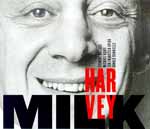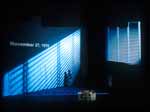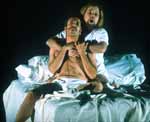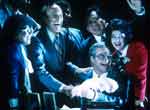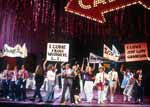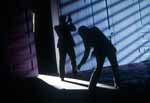|
Just as almost all Americans over forty can easily remember what they
were doing when they heard that President Kennedy had been shot on
that November day in 1963, most San Franciscans over thirty can readily recall how they heard about the shootings of Supervisor Harvey Milk and Mayor George Moscone on that tragic Monday morning in November of 1978.
There was a sharp chill in the San Francisco air that evening, as, almost
as if by some unspoken instinct, the host of mourners assembled at the
corner of Castro and Market Streets. Many in the crowd shivered as, by the thousands, they made the march down Market to City Hall.
The throng marched in a sort of stunned silence broken only by the
muffled cadence of a drum someone had thought to bring. As the road
sloped downward, a backward glance revealed the vast expanse of
countless twinkling candles carried by the marchers, a living flow of light that moved in waves and billows.
Who would have thought there were so many candles in all of San Francisco!
Impassioned eulogies on the steps of City Hall, tears of disbelief, the
first-ever public performance by the San Francisco Gay Men's Chorus, the events of that night remain unforgettable. (My old corduroy coat still bears the wax spills from my dripping candle.) Those who marched could sense that they were part of something far greater than a local civic tragedy--something deeply momentous and historic. Harvey Milk, San Francisco's first openly-gay elected official, had ended his earthly life and instantly passed over into the land of martyrs and heroes, to the realm of legend and myth.
It is in myth, the ancients knew, that the greatest of human truths can be fathomed. And of such stuff are operas made. More than twenty years have elapsed since Harvey Milk made his first run for public office in San Francisco. (He ran unsuccessfully three times before finally getting elected.) A whole new generation of younger gay people has emerged now for whom he is less a historic reality than a legendary pioneer, symbolic of an earlier struggle whose benefits they now enjoy. His history has been well documented, particularly by Randy Shilts's excellent biography The Mayor of Castro Street and by Rob Epstein's Academy-Award-Winning film documentary The Times of Epstein's Academy-Award-Winning film documentary The Times of Harvey Milk. It was perhaps inevitable that Harvey's story would eventually reach the stage.
That it should be in the form of an opera is entirely fitting, for Harvey Milk was, among other things, an opera lover. Five days before his
assassination (not on its eve, as is sometimes reported), Harvey and his
lover Scott sat in Box A at the San Francisco Opera (in a scene depicted in the opera itself), as guests of the Company for a performance of Tosca.
With them in the box was recording executive Terence McEwen (later San Francisco Opera's third General Director), escorting the legendary
soprano, then in her mid-seventies, Bidł Sayćo. McEwen recalls how
thrilled Harvey was to meet the diva who had been one of his idols during his youthful visits to the old Met (as re-enacted at the beginning of the opera). Milk even wrote an enthusiastic thank-you note which arrived at McEwen's New York office the day of the funeral services. Would the opera-loving Harvey be pleased, then, to know that he is now the subject of an opera himself? Who could doubt it!
Credit for the idea of creating an opera about Harvey must go to John
Dew, the British opera director active in Germany. (Dew recently staged
his own production of Harvey Milk in the German city of Dortmund.) While working on a project for Houston Grand Opera, Dew broached his idea to the company's General Director David Gockley. Gockley was intrigued, and suggested the project be given to the composer/librettist team of Stewart Wallace and Michael Korie, both in their thirties, who had created the successful opera Where's Dick? for Houston in 1989. Houston then set about to enlist San Francisco Opera and New York City Opera as co-commissioners of the new work, which had its premiere in Houston in January of 1995 and was given in New York the following April. San Francisco Opera's decision to involve itself in the project was not automatic, nor was it easily made. A subject so close to home was hard to ignore, to be sure, but if the scheme were to turn out badly, there would be recriminations aplenty for choosing a new work for the wrong reasons.
Librettist Korie took pains to involve SFO's General Director Lotfi Mansouri and his staff in the development of the libretto, and composer Wallace journeyed twice to San Francisco to play through portions of the score for Mansouri and Music Director Donald Runnicles. Only when convinced that the project would be not only worthwhile but also stimulating operatic fare for San Francisco's audience did Mansouri give Harvey Milk the nod.
Korie spent several weeks in San Francisco researching his subject and
talking with Milk's colleagues and friends. Not surprisingly, he amassed
more material than he could use, and the first draft of the libretto suffered from an attempt to tell too much of the long story of the modern gay rights movement. ''I did fourteen drafts,'' Korie stated in an interview for Houston Grand Opera. ''It wasn't until I read Randy Shilts's own obituary [he died of AIDS in February of 1994] and its references to the Milk book [The Mayor of Castro Street] that I fully realized the focus should be less on politics and more on what Harvey achieved during his lifetime.''
Neither Korie nor composer Wallace were ultimately interested in a purely documentary approach to their project, that had already been done, and done well. Their portrait of Milk is unapologetically mythic, for they recognized that opera is not a journalistic medium that thrives on factual detail, but rather an art form that demands larger-than-life characters, distilled utterances, telescoped events, and a focus on a handful of main protagonists.
The opera is structured in three acts. The first, subtitled ''The Closet,''
depicts Harvey's boyhood, his constrained life as a Wall Street
stockbroker, his encounter with hippie-style gay activist and soon-to-be lover Scott Smith, and his ultimate resolve to openly embrace his dual identity as both a Jew and a homosexual. The act culminates in the
historic 1968 Stonewall Riots in which police raiding a Greenwich Village bar were shocked to find drag queens fighting back, an event now viewed as the birth of the modern gay rights movement.
In Act Two, ''The Castro,'' Harvey's political campaigns are painted against the backdrop of San Francisco's burgeoning and flamboyant gay
community in the seventies. It concludes with Harvey's 1977 election as
Supervisor and a celebratory Gay Pride parade.
Act III, ''City Hall,'' provides an unvarnished glimpse of Harvey the
consummate, back-slapping political deal-maker, and his legislative
run-ins with fellow Supervisor and ex-policeman Dan White, whose
failure to understand political compromise, even more than his rigid
intolerance, was to spark the psychological disintegration that
transformed Supervisor into Assassin.
By molding the Dan White role for a wholesome-sounding Irish tenor, the opera succeeds in providing a vividly three-dimensional musical portrait of its villain and his inner conflicts. Yet Wallace and Korie wisely chose to take the Dan White story no further than the assassination itself, omitting any reference to White's trial, his infamous ''Twinkie defense,'' or the destructive ''White Night riots'' at City Hall following the lenient verdict he received. (White committed suicide shortly after his early release from prison.) Tragic as his character may be, this was not, at its core, to be an opera about Dan White.
Instead, its conclusion underscores the mournful candlelight march with a setting of the ''Kaddish'' (a Hebrew prayer for the dead), and offers an apotheosis of Harvey Milk as a gay Moses, whose spiritual ''Messenger'' allows him to glimpse a future Promised Land full of new freedoms, but telling him ''I have let you see it with your own eyes, though you may not cross there.''
The Texas-born Wallace's music is unabashedly eclectic, reflecting the
dual influences of his experience in a rock band and as his synagogue's
cantor. Modern classical dissonance coexists in the opera with Romantic
lyricism, jazz, funk, rock, and Broadway styles in a distinctly American
blend.
The opening bars of the opera strike the listener with their seriousness,
as an offstage chorus (described in the score as ''guttural, nasal, like
Tibetan chant,'') intones the Kaddish while Harvey's assassination is
presaged onstage. Much of the action to follow in Act I has a surreal
quality, with a fluid, almost cinematic time sense that allows events and
scenes to overlap or occur simultaneously. The directness of the teenage
Harvey's rhetorical soul-searching (''Who are these men without wives?'')
is blended with a campy chorus of opera queens and Central Park
cruisers, while Harvey's mother lingers in the background (or in Harvey's
imagination), summoning up reminders of the Jewish Holocaust.
Certainly the passage that will strike traditional opera-goers as the most
unconventional is the Act I ''Closet Scene,'' in which the closet metaphor
is taken literally, and we find Harvey backed by a trio of
Andrews-Sisters-style lovers (sequential boyfriends telescoped into a
single moment) breezily cavorting in a real clothes closet, assuring
themselves ''This is the best we can hope for!'' (In the Dortmund
production, since the German language doesn't use the idea of ''the
closet'' as a metaphor for undisclosed homosexuality, the scene was
changed to a public toilet, or ''Klappe'' in German slang, symbolic of the
anonymous encounters that offered the sole sexual outlet for closeted
gays; the Stonewall rioters' chant ''Out of the closets and into the streets''
became Raus aus der Klappe und auf den Asphalt!)
Despite its potentially unsettlingly absurdist character, the Closet Scene,
with its confrontation between Harvey and German visitor Horst in an
argument about the Nazis, serves to highlight Harvey's self-identification
as a Jew who stands up for his rights. Viewed by some critics as
gratuitous, this scene actually becomes the important springboard for
Milk's further resolve to stand up as ''a man who loves men.'' The Young
Harvey's earlier curiosity about ''men without wives'' is transformed into the older Harvey's cry of self-critical revelation: ''We are the men without lives.'' This introduces his dramatic coming-out aria, the turning-point in the opera, as camp is left behind and music of impelling sweep and emotion takes over. In his powerful aria he calls upon the Nazi symbols for Jews and homosexuals to invoke a double image of Yellow and Pink Triangles. ''They overlap as I do,'' Harvey declares.
Thus transformed, Harvey is propelled into the maelstrom of the
Stonewall riots (a non-historical but highly theatrical turn of events), and Wallace's music takes on a Broadway bent ą la Leonard Bernstein. A
scene featuring marauding drag queens, after all, somehow has to evoke
a show tune!
At the New York premiere of the opera, a nonplussed opera critic
remarked after this unconventional first act, ''I don't know what to call this, but it's not an opera!'' Although his opinion later changed, he remained indignant that the libretto for the Harvey-Scott duet that ends Act I insists on rhyming ''moon'' and ''June.'' One could only offer, in defense, the fact that the Stonewall riots did indeed occur on a ''warm night in June.'' Why fight the inevitable?
In the second and third acts we leave the surreal behind, but the
cinematic approach to scene-building continues, as the breezy,
only-in-San-Francisco atmosphere of the Castro district in the 70's
comes to life. Harvey's many political campaigns are condensed into just two, the first a failure, the second an election triumph that transforms itself (bending history ever so slightly) into that by now familiar San Francisco institution, the Gay Parade.
Recognizing that the stuff of politics, especially city politics, would make rather poor fodder for operatic treatment, Wallace and Korie began Act III by concentrating instead on politicians, whose oversized oratory lends itself readily enough to song. A poignant scene for Milk and Moscone, in which political arm-twisting is tempered by genial camaraderie, acts as a moment of calm before the inevitable violence we know is coming. Like any good operatic hero, Harvey had the foresight to envision his own assassination. The tape-recorded instructions he left for his friends make an apt contribution to his own opera's libretto: ''If a bullet should enter my brain, let it shatter every closet door!''
Following the Houston and New York performances in 1995, Wallace and
Korie set about to make some important revisions, primarily in the
opera's second and third acts, many of which will be heard for the first
time in San Francisco. Working closely with Donald Runnicles, with
whom he went over the orchestral score bar by bar, Wallace revised the
orchestration with a view toward clarifying orchestral textures and
affording greater variety of orchestral color. The passages depicting
Harvey's first (losing) campaign in the second act have been tightened to proceed more swiftly to the important, lyrical Harvey-Scott bedroom duet, with its symbolic and poignant hair-cutting scene. (''Hippies don't win elections,'' Scott admonishes.)
Wallace has also re-worked the conclusion of the opera, following
Harvey's death, by trimming and re-ordering its elements, the Kaddish,
reflections by Henry Wong (a fictional, composite character) and Anne
Kronenberg, the candlelight march, and the Messenger's final
appearance, to heighten the dramatic impact.
As a counterbalance to the powerful Dan White moments in the third act, the role of Harvey has been given increased dramatic prominence with two new solo scenes: ' In a short soliloquy, ''Goodbye, Judy Garland'' (inspired, Korie says, by one of Harvey's newspaper columns), sung just before the Supervisors vote on a gay rights ordinance, Harvey reflects, a little wistfully, that the older, closeted generation of which he was part is giving way to a new era of youthful, in-your-face gay rights activism.
' An extended aria, just before Harvey's assassination, voices his angry
regrets about the silence of his younger years, as he defiantly proclaims his manifesto:
The lies we told our mothers
Turned to shame,
And shame to rage,
And rage to pride,
And pride to hope,
And hope will never be silent.
More than one music critic of our day has disparaged what has been
called ''The CNN School'' of opera-American works based on the lives of
news-making figures like Malcolm X, Richard Nixon, Rudolph Valentino,
Leon Klinghoffer, Marilyn Monroe, Patty Hearst, and, of course, Harvey
Milk. Not all news-makers, to be sure, embody the poetic and historic
sweep of emotion that can provide what opera so vitally needs,
something to sing about. Yet in Harvey Milk, outrageous hippie turned gay icon, Wallace and Korie have found just the sort of controversial,
inspirational, and, yes, operatic, subject to engage modern audiences,
both gay and straight.
©1996 Clifford Cranna, All Rights Reserved.
Clifford (''Kip'') Cranna is San Francisco Opera's Musical Administrator
and Education and Program Adviser to the Carmel Bach Festival.

|
